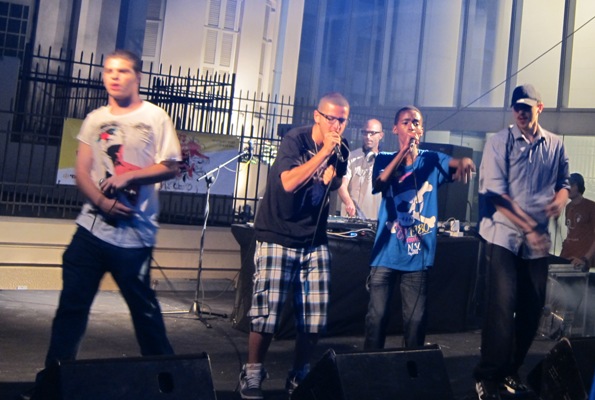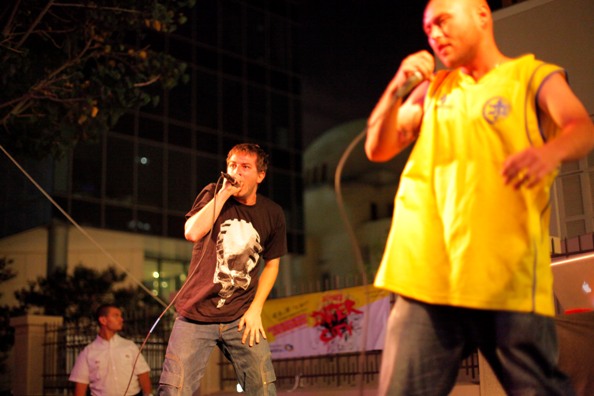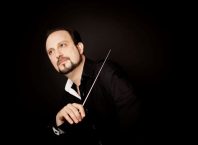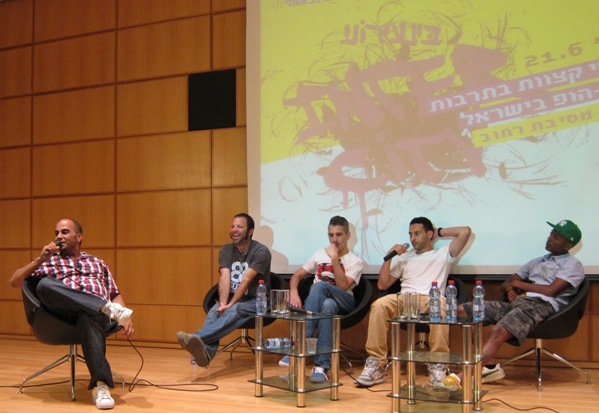
If you’ve spent more than half a minute on the Israeli cultural scene, chances are you’ve heard the word “periphery,” (periferia in Hebrew) which loosely translates as “anywhere but Tel Aviv.” Last Tuesday, June 21, 2011, there was a meeting of extremes at InterCity – music critics and rappers – broadcaster Liron Teeni, Yoav Kutner of Galatz, Shaanan Streett of HaDag Nachash, Eyal (Quami & the Halvoth) Freedman (Hakatze radio), Tamer Nafar of DAM, and Kalkidan discussed hip hop culture and the relationship between the periphery and the center at the First International Bank of Israel, followed by an outdoor rap concert.
The facebook commentary preceding the event revealed that some music fans and social activists questioned the presence of rappers at such a venue. Produced by Eyal Vexler & Koby Even Haim, InterCity is part of a series of cultural events sponsored by the bank – free and open to the public. Previous events have included screenings of Israeli documentary films relating to social issues. From my perspective: if banks and other profit-making organizations decide to allocate money to music and other cultural events – I’m all for it. There is no doubt in my mind that banks and other organizations are involved in these events in order to improve their public image – so what? In fact, one might argue that the big money-makers of our society should be concerned about their public image.
InterCity brought together onstage a terrific group of creative thinkers and musicians, and rocked Rothschild Boulevard with the sound of rappers from Petach Tikva, Jerusalem, Lod, Yavneh and Nazareth. These are people with something to say, and the bank gave them a platform. What did they say? Read on…
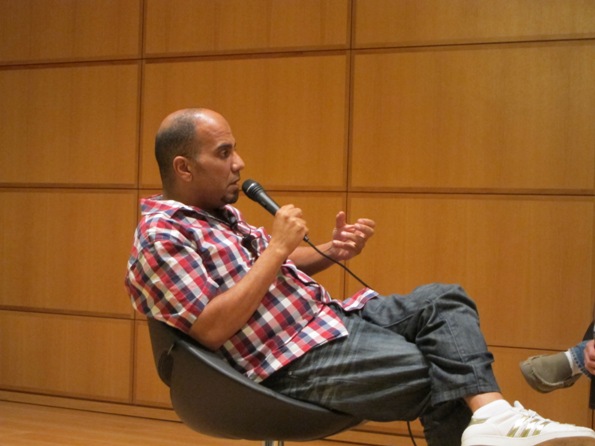
Moderator Liron Teeni opened with the comment that hip hop is not just music; it can be an instrument for social change, for artists in places that don’t have much money, saying “In hip hop all you need is a brain.” He asked the panel members the word “periphery” means to them.
Yoav Kutner replied that “Most of Israel is periphery.” Shaanan Streett said, “Is it a question of geography? I think it is a state of mind more than anything else. Being a member of a minority is also puts you in the periphery. Whoever does not embrace the mainstream narrative has a hard time with the Israeli mainstream. Quami spoke of the peripheral places within the center, “discovering how many cities exist within Tel Aviv …and sometimes its enough to walk one street over.”
Tamer Nafar expressed a different perspective, saying “For me it is a geographic issue. Ten years ago I began representing the problems in Lod. In the beginning I had to do it in Hebrew in order to be heard.” (link here to the lyrics to “Born Here” in English) While Kalkidan said, “It is not geographic. It’s much deeper. It’s wherever I see large concentrations of Ethiopians, lots of people who look like me.”
Is the periphery something that can be heard? Teeni asked the panel members if they feel something different in the music itself, when they hear music that comes from the periphery. Once more, the diverse panel presenting diverging views. Nafar said, “It happened when I heard Bayan (Alex, an immigrant to Israel from Russia, known for the song HaAretz Hamuvtahat (Hebrew – the promised land) who has since left Israel, read more here). As someone who knows Hadag Nachash, suddenly I heard someone who didn’t speak Hebrew. As a member of a minority it empowered and challenged me.” While Kutner said, “As a listener I don’t care about anything other than the music. I either like it or I don’t like it. Other than Arik Einstein who was born in Tel Aviv, everyone is in the periphery. Coming from the periphery gives you an incentive to succeed.” For Kalkidan, “identifying with someone like Tupac you feel a kind of connection.” The slippery complexity of these definitions was pointed out by Quami, who said, “The Clash is a working class band but Joe Summer was a rich boy, his parents were some kind of aristocrats. He left it all and did all he could to conceal his past, but you don’t always know [if someone is really working class etc]. Technically – the music was, he wasn’t.”
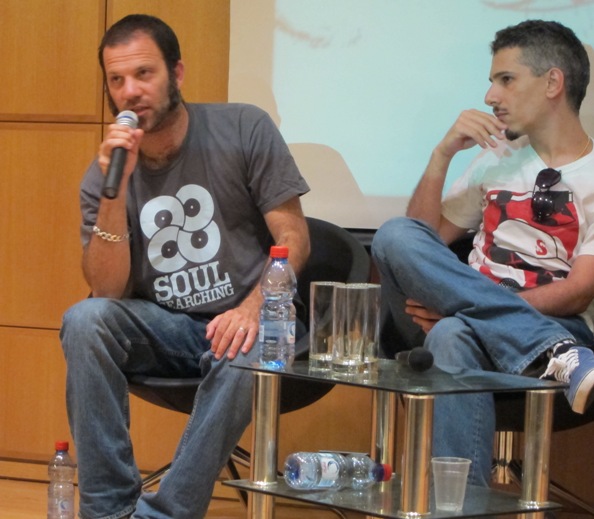
“Periphery is a state of consciousness,” said Streett, “As a listener, a consumer of art, I look for truth, and it shines more when it hurts. The voices from the periphery are not just marching alongside the mainstream, they are leading it. The function of the center is to sell tickets and crown kings; the role of the periphery is to discover the new sounds.”
Kutner further deconstructed the notion of periphery, saying, “I lived in Jerusalem and I came from a broken home. I lived in Rehavia (an affluent neighborhood) – it doesn’t matter where you come from.”
Reflecting on the dangers of success, Teeni asked whether happy, successful artists are doomed to become less interesting. Streett thinks not, presenting the view that the principle remains the same: “If you tell your story, as it is today.” He also pointed out the advantages of success, “your possibilities of quality production – producing tracks on a level of quality that you couldn’t aspire to previously…there are ways of expressing yourself in a true way.”

Reflecting on the state of hip hop in Israel, Kutner said, “There are artists who took hip hop and castrated it, turning it into a ma’afan [Hebrew slang – lame] kids’ game. Here in Israel hip hop is shoko [Hebrew – chocolate milk], it’s Carlos [a brand character related to shoko], it’s entertainment at a Bar Mitzvah.”
Quami was in agreement, saying, “Hip hop in Israel has become part of the establishment, something nice for the whole family. Is it a form of protest – I don’t know… it is style of counterculture. In the US it has become a subculture, like identifying with metal, in Israel it soon become polite.”
“I think that the people who adopted hip hop are those who have MTV at home,” said Nafar, reflecting a different perspective, “Most of the people in my neighborhood don’t have MTV. I think that Mizrahi music had an element of social protest in the beginning, the “cassette music.” In terms of being an effective channel of social protest in Israel, Nafer noted, “Hip hop didn’t come from here.”
Teeni asked the panel members, “When you go on stage your truth as an Arab, as an Ethiopian – if I were to walk in your shoes, would it be hard?”
Kalkidan quipped, “It depends on what day…not all my music is about being black.”
Teeni added, “Sometimes people don’t want to hear someone else’s truth.”
Nafar referred to Andersen’s familiar fairy tale, saying “Ultimately, the winner is the child who shouted out the Emperor has no clothes. The hip hop scene in Israel was immediately translated into Zionism and Israeli flag-waving. Like Subliminal’s Hafred umshol. Compare that with Gabby & Debi by Hadag Nachash. Its subversive message places them in a minority. If I write songs about sex, that places me in a minority among Arabs. Being a minority is also what you say and what you bring.”
Kutner stated the situation plainly, “The Israeli audience usually seeks escapism. In the US if 3% of the population likes you then you are already selling…Zeev Tene – who heard of him? Most Israelis don’t do protest music. Most Israeli music is “me, me” or dahkot (Hebrew slang – kidding around, gags).” Kutner cited the Hadag Nachash “Ani Ma’amin” (Hebrew – I believe) song saying “that we are also to blame that we don’t have peace. No one takes notice, no one cares, our audience is indifferent.”
Quami added, “As opposed to the daily violence of our lives, in music we expect a lot of politeness. People can’t accept something daring, that protests. There are exceptions – Hadag Nachash, Portis, Saharof – people making music with a subversive fire, but most musicians try to make friends with the audience – come to my concert, I’m no threat. The audience doesn’t like it when the music butts into their lives – ‘how dare you!’
Throughout the discussion, Hadag Nachash came up so many times that the panel members suggested that perhaps the purpose of the panel was to award the Israel Prize to Hadag Nachash – not a bad idea. Kidding aside, it is clear that the group occupies a unique place on the Israeli scene, immensely popular despite (or because?) the fact that their music makes a strong political statement. Teeni asked, “If you really protest – who will listen? How is it that Israeli audiences “let” Hadag Nachash protest?
Streett responded simply, “We started out that way, from our first album and people liked it. They expect it [protest] from us; they expect us to be that way. We will surprise them if we bring a song that doesn’t talk about what’s happening, that doesn’t talk about these things.” Ultimately, it’s all about making good music – with a little help in referencing from an audience member, Streett quoted Emma Goldman, saying “If I can’t dance, then I don’t want to be in your revolution. If we didn’t have funk in our veins then we’d be doing something else.”
Nafar concurred, pointing out the problem that protest songs have a tendency to the “teachy preachy” saying of Hadag Nachash, “their music sounds good. Every cab driver knows Hahalifot and the Sticker Song.”
Coming around to the internet, Teeni said, “On Facebook and YouTube no one is on the periphery. Do you think that the internet puts the center and periphery on equal terms?”
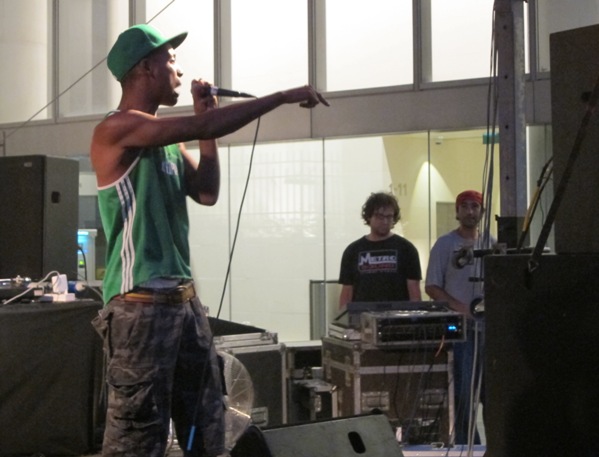
“Hell, yeah,” said Kalkidan, recalling his origins in Israel, and in rap, “I started rapping because of a problem. I came to Israel in 1989, when I started first grade the principal asked me ‘what is your name?’ and when I told her she said, ‘You have to change it.’ I lived with a different name and identity for years, until I was 13. I brought my name back through hip hop, resurrected it. I felt that she had killed something within me…I don’t need to wait until a broadcaster says “I feel like hearing what this Ethiopian has to say.” This [posting music to the internet] is the only way I came to be here now.”
“The internet is a gigantic café,” said Quami, “and everyone hangs out there. The impact has the potential to be tremendous.”
Nafar pointed out succinctly, “The revolution in Egypt was not on the radio, it was on facebook.”
When the panel opened up to questions from the audience, it was no surprise that one of the first to surface related to their decision to perform “at an event that is sponsored by a bank.”
Quami said, “I usually take advantage of every stage I am given in order to say those things I want to say. And as someone who has something to say, I’ll fucking say them.”
“I knew that this would be a rare event,” said Kalkidan, saying that 99% of the people present would not be likely to hear him, were it not for this event, “If there was a performance at the police station I would perform there because they [the police] would be there and hear me.”
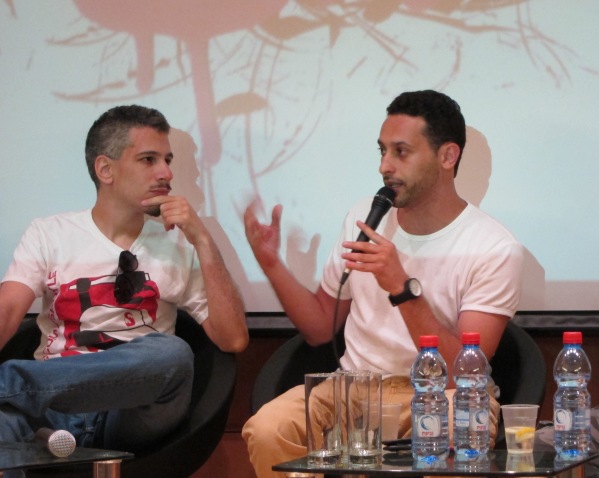
“It was more difficult for me,” acknowledged Nafar, “it’s not just a question of the bank, it’s also a question of appearing in Israel. I haven’t done it since Gaza…there is a boycott… Don’t buy milk – it’s from Israel, Ok, so I didn’t buy milk. What do I drink now? I will take advantage of the stage … we always blame people for using money for the wrong things …as soon as I have money, I’ll love the bank.”
A woman from the audience responded, telling Nafar, “But you don’t take advantage of every stage, you’ve given up on us, on the Jews.”
Nafar said, “Liron [Teeni] knows me. At first we sang in Hebrew. Perhaps I do need to choose sides…yes I’ve given up… there are more things I want to say…”
The second part of the evening said it with music, as rappers took the stage in the outer courtyard, drawing an appreciative crowd. Midnight East recommends – let’s have more evenings like this.
